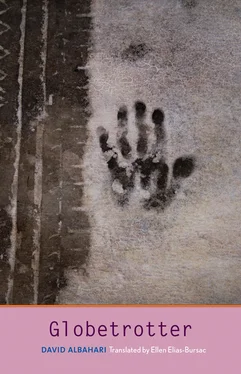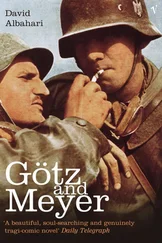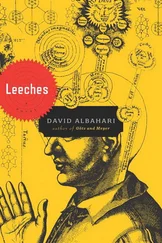I wasn’t sure how to understand these words, just as I wasn’t sure whether they had anything to do with me, and what — if they were referring to me — was implied by “grain” and what by “desert.” Was Daniel Atijas speaking of love or devotion? Was there a difference? Whatever the case, I knew from that moment on that there was something that could serve as consolation, and things are always easier to take with consolation, even the least likely sort, than without it. When I think of his earlier words, I feel that Daniel Atijas would have approved if only I had asked him. I did not, however, say anything. We stood next to each other on the little terrace out in front of the restaurant, and while Daniel Atijas squinted and basked in the sun, I was fidgety with restlessness, clinging to my fragile consolation. Later, when we came over to the staircase leading to the entrance to the dining hall, we caught sight of Ivan Matulić’s grandson. While I was watching him, hunched slightly over, walking along the path that ran from the parking lot, I promised myself that I would be courteous and that I wouldn’t say anything I might later, ever, regret, but I did not succeed, I admit, in fully suppressing the malice I felt when he had almost reached us and I saw that his face was showing traces of the events of the night before: the bags under the bloodshot eyes, the ashen pallor, the visible wrinkles. It did not, of course, occur to me that I might look the same, just as Daniel Atijas did, after all, and that the malice belonged to all of us at once and to the same extent. I mustered the stamina to greet Ivan Matulić’s grandson with a smile, and then, looking out of the corner of my eye while being extremely nonchalant, I paid close attention to how Daniel Atijas and he greeted each other, what they said, where their hands were, and, in the end, whether they were arching their eyebrows as a sign that they were overjoyed at seeing a person they cherished.
Ivan Matulić’s grandson was, in fact, quite restrained, and it was easy to see that he was being cautious when we began talking about the previous night. It turned out that each of us remembered the night as a sequence of blank stretches between which events played out that at times made sense and that at others were extremely cryptic. So Ivan Matulić’s grandson knew how I’d made it to my room, a trip of which I knew nothing; Daniel Atijas knew exactly when Ivan Matulić’s grandson sat in his car and, despite his drunken state, drove off toward Canmore, while the grandson remembered only the driving but not the instant when he took his seat in the car or the moment he got out of it; I remembered when Ivan Matulić’s grandson tried to kiss Daniel Atijas’s feet, which neither of them recalled and which neither really cared to recall. When he had gotten tired of hearing me say over and over that I was going to die or some such nonsense, said Ivan Matulić’s grandson, he resolved to take me to my room, no simple task, he said, for first he had to figure out where my room was, but once he’d extracted that information, he said, the journey was not so arduous, certainly not as difficult as the effort he’d had to invest in working out how to keep the door to Daniel Atijas’s room from shutting while he was taking me, because he could not, he said, get the key from Daniel Atijas, who was snoring loudly and refused to stir, no matter, he said, how hard he tried to wake him, as, God knows, he did.
In the end he jammed a slipper under the door, though he fretted the whole time he was going down in the elevator and as he rode back up whether he would find the door shut, which would have meant, since Daniel Atijas was sleeping, that he would not have been able to get into the room, but everything worked out fine after all, or rather seemed fine until he brought me to my room, where I thanked him for his efforts in the most ordinary voice, as if sober that instant, entered the room, and shut the door, but when he turned to go back to the elevator, he heard a crash and, assuming I’d fallen, came back to my door, where, after knocking softly and calling to no purpose (he had to keep in mind, after all, the rules of good behavior, which meant that he couldn’t kick the door with all his might or holler my name, though even that wouldn’t have helped much, he believed; indeed, it wouldn’t have made a whit of difference), he, after the soft knocking and calling, finally went back to the elevator, glancing over his shoulder as he went, and rode up to the third floor, where his concern for my welfare, he said, gradually gave way to anxiety about the stability of the slipper under the door to Daniel Atijas’s room, and luckily — for had the door slammed shut, he said, he really would not have known what to do — luckily the slipper was where he’d left it, just as Daniel Atijas was where he had left him, having moved only a little. Daniel Atijas raised his head and asked where I was, but before Ivan Matulić’s grandson was able to tell him anything, his head dropped back onto the pillow, and back to sleep he went. In short, I could breathe a sigh of relief, but I was still wondering, though I didn’t dare ask, what happened later while he and Daniel Atijas were alone, between the time when Ivan Matulić’s grandson returned to the room and the time he left for Canmore.
Knowing of our memory lapses, I could readily assume that everything proceeded in that blurred state between waking and sleeping, though I still quaked, in part because nothing is less sure than human nature. Rare is the person who can keep his pledge to the end, whatever the pledge may be, and I saw no reason why Daniel Atijas would be any different, nor, after all, was I. In the end, Daniel Atijas had no obligation to me, and if there ever was someone who did have an obligation, then that was I, except that the obligation was not so much to him as to myself, which comes down, in extreme cases, to the same thing. As to the question of lunch that one of us had raised, Ivan Matulić’s grandson said he would not be able to even think of food for days, and as far as he was concerned, a bowl of soup would do just fine, though now that he was thinking about it, tea would suit him best. Daniel Atijas chimed in, adding that it would be nice to have the tea elsewhere because he was getting sick of the dining hall at the Banff Centre — not the facility, he added, but the atmosphere, the smell of food that seeped into everything, and the excited voices of the hungry people, resonant at first and then, as the lunch proceeded, duller and duller, less and less vibrant, until finally there was nothing left but a swallowed yawn and a yen for a nap. He knew, of course, that the atmosphere wasn’t a question of choice, it was a physical inevitability, but ever since he had become acquainted with the habits of northern Europeans and their preference for a main meal in the evening, closer to the time one retires yet not so close as to disturb their sleep, which, as he had seen earlier, was how Canadians and Americans ate as well, he had become so partial to that dining schedule that he had given serious thought as to whether it might have shaped relations between the north and the south, thinking, of course, of the south of Europe, the Mediterranean, where people are known to take every opportunity to nap and sometimes spend more time asleep during the day than at night.
There could be no question but that the north was more advanced than the south, and not only where Europe was concerned. Elsewhere the north was advanced, while the south was mainly in disrepair, and this encouraged him in his conviction that there ought to be in-depth research done into the nutritional habits of southerners and northerners across all the continents, including Africa and Australia. Such a detailed study, he said, might entirely uproot the assumptions we have about the purpose of meals and sleep, meaning, in other words, that the final outcome might completely change the way people think about themselves, and change the world. One never knows where the turning points are, where the lever of change rests, he said, and we seldom, if ever, recognize turning points when they appear but only later, once the change has irreversibly begun and we are surprised by how we failed to spot it, or, conversely, we pretend we did notice it, but this is usually an out-and-out lie. Now, he said, in his country everyone is saying that from the start they knew what would happen and where things were headed, but the truth of the matter is that ten years earlier no one had had any clue as to the degree of horror, devastation, and human degradation that would one day be deemed history.
Читать дальше







![David Jagusson - Fesselspiele mit Meister David [Hardcore BDSM]](/books/486693/david-jagusson-fesselspiele-mit-meister-david-har-thumb.webp)




